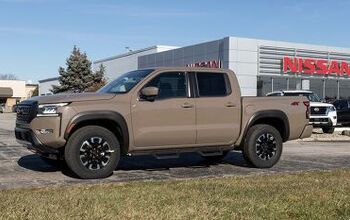Video: Elon Musk Admits Tesla Almost Died Over the Summer

According to Tesla CEO Elon Musk, the automaker was teetering on the edge of disaster earlier this year. “Tesla faced a really severe threat of death due to the Model 3 production ramp,” Musk told Axios during a video interview on HBO. “Essentially the company was bleeding money like crazy and just if we didn’t solve these problems in a very short period of time, we would die. And it was extremely difficult to solve them.”
Musk said Tesla was within “single-digit weeks” of an unrecoverable catastrophe. While we appreciate his present candor, the assertion doesn’t mesh with comments made earlier.
In fact, Elon was down on the automotive firm needing more funds every since it posted its 2011 financial results. “Tesla does not need to ever raise another funding round,” he said in response to a question on the company’s cash position back in February of 2012. “We may want to do so, but we are in a strong cash position, and we don’t need to.”
That narrative has been revisited several times, with the most recent examples occurring this summer when Musk said Tesla would not be raising equity at any point. “Are we running low on money? The answer is no,” he said last August. The CEO even joked that the company had gone bankrupt for April Fool’s Day 2018, in a snide response to industry analysts who claimed the automaker was quickly running out of cash.
However, it appears the automaker actually needed quite a bit of funding to keep itself away from the cliffs of doom. Based on Musk’s interview, the period where he was sleeping at the factory this summer was also the moment when Tesla was in the worst trouble. Meanwhile. automotive outlets — including this one — suggested Tesla’s situation was more dire than it let on.
Fans of the brand didn’t see it, however, and often had their rebuttals at the ready. While we’d normally love to bask in the warmth of a well-earned “told you so,” the mere fact that the public’s trust in Tesla never seems to waiver is one of the reasons for its success. In fact, Musk’s hype-driven narrative was probably an essential piece of Tesla’s overall strategy. It accomplished its goals, eventually hitting Model 3 production targets without additional fundraising — albeit with some serious hiccups.
Musk’s attempt to take the company private was a big distraction over the summer and the Model 3 has still spent the majority of its life behind schedule. The Axios segment appears to illustrate just how beaten-down the process left the CEO. He admitted that nobody should work as hard as he did in 2018, adopting a defeated posture. “It hurts my brain and my heart,” he explained.”It is not recommended for anyone. I just did it because if I didn’t do it … there was a good chance Tesla would die.”
However, it doesn’t change the fact that the company’s leadership wasn’t upfront about its situation. But when has that ever been the case with an automaker? They alway promise the moon while delivering the closest approximation they can muster. While this might feel like a slap in the face, it’s really just another reason we should keep our eyes wide open when watching the industry.
[Image: Tesla Motors]

A staunch consumer advocate tracking industry trends and regulation. Before joining TTAC, Matt spent a decade working for marketing and research firms based in NYC. Clients included several of the world’s largest automakers, global tire brands, and aftermarket part suppliers. Dissatisfied with the corporate world and resentful of having to wear suits everyday, he pivoted to writing about cars. Since then, that man has become an ardent supporter of the right-to-repair movement, been interviewed on the auto industry by national radio broadcasts, driven more rental cars than anyone ever should, participated in amateur rallying events, and received the requisite minimum training as sanctioned by the SCCA. Handy with a wrench, Matt grew up surrounded by Detroit auto workers and managed to get a pizza delivery job before he was legally eligible. He later found himself driving box trucks through Manhattan, guaranteeing future sympathy for actual truckers. He continues to conduct research pertaining to the automotive sector as an independent contractor and has since moved back to his native Michigan, closer to where the cars are born. A contrarian, Matt claims to prefer understeer — stating that front and all-wheel drive vehicles cater best to his driving style.
More by Matt Posky
Latest Car Reviews
Read moreLatest Product Reviews
Read moreRecent Comments
- Zerofoo An almost 5000 pound hot hatch that fell out of the ugly tree and hit every branch on the way down? No thanks.
- Tassos Jong-iL This would still be a very nice car in North Korea.
- Jeff One less option will be available for an affordable midsize sedan. Not much can be done about GM discontinuing the Malibu. GM, Ford, and Stellantis have been discontinuing cars for the most part to focus on pickups, crossovers, and suvs. Many buyers that don't want trucks or truck like vehicles have moved onto Japanese and South Korean brands. Meanwhile large pickups and suvs continue to pile up on dealer lots with some dealers still adding market adjustments to the stickers. Even Toyota dealers have growing inventories of Tundras and Tacomas.
- Lorenzo This car would have sold better if there was a kit to put fiberglass toast slices on the roof.
- Lorenzo The Malibu is close to what the 1955 Bel Air was, but 6 inches shorter in height, and 3 inches shorter in wheelbase, the former making it much more difficult to get into or out of. Grandma has to sit in front (groan) and she'll still have trouble getting in and out.The '55s had long options lists, but didn't include a 91 cubic inch four with a turbo, or a continuously variable transmission. Metal and decent fabric were replaced by cheap plastic too. The 1955 price was $1765 base, or $20,600 adjusted for inflation, but could be optioned up to $3,000 +/-, or $36,000, so in the same ballpark.The fuel economy, handling, and reliability are improved, but that's about it. Other than the fact that it means one fewer sedan available, there's no reason to be sorry it's being discontinued. Put the 1955 body on it and it'll sell like hotcakes, though.


































Comments
Join the conversation
Thermodynamics …it’s the law™
https://www.youtube.com/watch?v=Swvf3w6hcY4